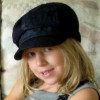OCD Encounter
Ritual behavior
I worked with a girl named Barbara. She was a stunning beauty. Her skin looked just like a peach. Her cheeks, a natural pink glow. She was friendly and seemed very happy. Men couldn't keep their eyes off her, but she showed no sign of self importance. That's why I liked her so much.
One day we were going to the break room. Someone had closed the door which was usually open. She stopped dead in her tracks and turned pale. I was concerned, and ask what was wrong. She began to stammer her words and pointed toward the door knob. " I can't touch that door knob! Would you please open it?" As strange as it was to me, I didn't ask her any questions. She later confided that she had an abnormal fear of dirt and was under the care of a psychiatrist. She said she had to go through the same cleansing routine every night or she couldn't sleep. Sometimes that included two baths. That was over 20 years ago, before there was help for such disorders.
I have since watched documentaries on the subject, and read many articles. The latest information that makes a lot of sense to me was written by Depak Chopra. He reasons that events may happen in our lives that will lodge within us, and we don't know how to integrate the conflict. So we spend time creating orderliness. A set way to behave through rituals allowing us to hide a deeper discomfort that might emerge. We get locked into phobias of heights, insects, dirt, etc. This state of imbalance takes it's toll on the mind, body and spirit. Today, there are medications to help ease the anxiety, while working with a behavioral counselor to get at the cause and bring it to the surface. Then it can be resolved.
October 4, 2011
Update: News article in St. Pete Times...Florida
OCD is difficult to treat, particularly in children. It's hard to find talk therapy geared to children. Many parents are reluctant to try drug treatment, fearful of side effects. Now University of South Florida researchers are offering an unlikely alternative, an antibiotic traditionally prescribed for tuberculosis. The medication: D-cycloserine (or) DCS. It appears to enhance the brain's ability to extinguish the fears that feed into OCD. USF psychologist already have promising results in a pilot trial of the anibiotic in children from 7 to 17. The hope is that If treated at an early age, the brain can almost reprogram itself and they can grow up to live as adults without the burden of the disorder.



